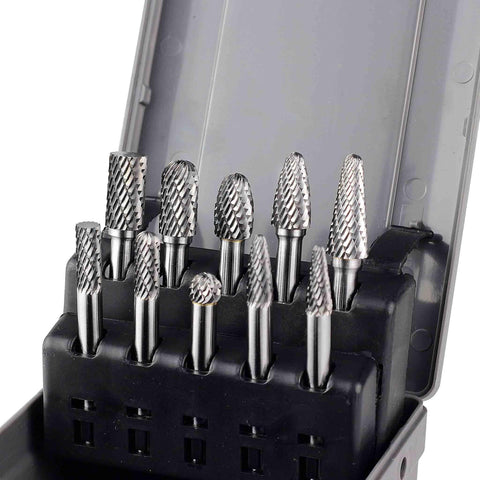Carbide burr bits are indispensable tools in the world of metalworking, offering versatility, precision, and efficiency when it comes to shaping, cutting, and grinding metals. These rotary cutting tools are made from tungsten carbide, a material renowned for its exceptional hardness and heat resistance, making it ideal for working with tough metals like steel, aluminum, iron, and copper. Carbide burr bits are favored by professionals across various industries, from automotive and aerospace to fabrication and metal art, because they allow for detailed shaping and finishing, even on the hardest materials. Their durability and performance make them an essential part of any metalworker's toolkit.
Carbide burr bits come in a wide variety of shapes, each designed to perform specific tasks, allowing for intricate work or aggressive material removal depending on the need. One of the most common types is the cylindrical burr bit, which is perfect for working on flat surfaces or for grinding down edges. This bit is often used in tasks like deburring, smoothing welds, or finishing metal surfaces to create an even, polished look. The cylindrical burr is highly effective when a uniform surface is required, especially in situations where precision and smoothness are key, such as preparing a metal surface for painting or coating.
Ball-shaped carbide burr bits are ideal for more intricate work, particularly when working on curved surfaces or recesses. The spherical design of the ball burr allows it to carve out concave shapes and make rounded edges or detailed cuts. For metal artists or manufacturers working with complex shapes, ball burrs offer the flexibility and control needed to create smooth contours without damaging the metal. Whether used in jewelry making or precision automotive work, these burrs provide the finesse needed to handle delicate curves or recessed areas that require a lighter touch.
For creating grooves, angles, or chamfers on metal, cone-shaped burr bits are indispensable. Their tapered design, with a pointed or rounded tip, allows them to reach into tight spaces and make detailed cuts that require accuracy. Cone burr bits are often used in applications where precision is essential, such as engraving, creating beveled edges, or drilling small holes in metal. These bits excel in tasks that involve fine detailing and intricate shapes, offering metalworkers the control necessary to achieve high-quality finishes on both small and large-scale projects. Their pointed tips make it possible to work in confined areas that larger burr bits cannot access.
Tree-shaped carbide burr bits, available in both pointed and rounded variations, are designed for working on internal cuts or hard-to-reach areas. The pointed tree burr is particularly effective for carving out sharp grooves or creating notches in metal, making it a popular choice for tasks that involve internal detailing or tight angles. The rounded tree burr, on the other hand, is ideal for contouring and smoothing out curved surfaces, providing a smooth transition between different parts of a metal piece. These burrs are commonly used in die-casting, mold-making, and metal fabrication, where intricate shaping and a smooth finish are essential.
Flame-shaped burr bits are highly versatile, offering a combination of precision and efficiency for shaping and finishing metal. The flame shape, which tapers to a point, is perfect for working along curved or irregular surfaces, providing a smooth cut while allowing the user to maintain control. These burr bits are frequently used in automotive repairs, where the removal of excess material from metal parts is required without compromising the integrity of the component. Flame burrs are also favored in metal sculpting and other artistic applications, where they can shape and refine complex metal surfaces with precision.
In addition to the various shapes, the cutting pattern of the carbide burr bit is also a crucial factor in determining its effectiveness when working with metal. Double-cut carbide burrs are particularly well-suited for metalworking due to their cross-cut pattern, which provides a smoother finish and faster material removal. These burrs reduce vibrations during use, leading to more control and a cleaner surface, making them ideal for tasks that require fine detailing or polishing. Single-cut burrs, by contrast, have a more aggressive cutting action and are typically used for rapid material removal on softer metals like aluminum or brass.
When choosing a carbide burr bit for metal, it's important to consider the type of metal being worked on, the nature of the task, and the finish required. Harder metals like stainless steel or cast iron often require a burr with a tougher cutting action, such as a double-cut burr, which can handle the material's resistance while producing a fine finish. Softer metals, on the other hand, may benefit from single-cut burrs, which provide faster material removal without clogging the bit.
Carbide burr bits are critical tools for anyone working with metal, offering unmatched versatility, precision, and durability. Their ability to handle tough materials while maintaining a sharp edge makes them invaluable in industries where metal shaping, cutting, and finishing are routine tasks. From cylindrical burrs for flat surfaces to ball burrs for detailed curves and flame burrs for complex shapes, the wide variety of carbide burr bits ensures that metalworkers have the tools needed to achieve professional results on any project.

